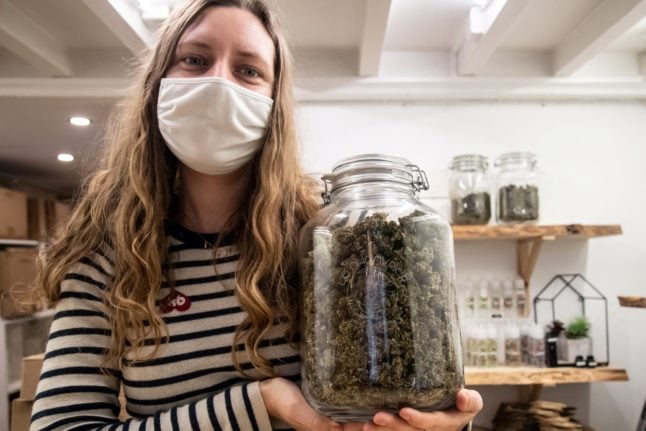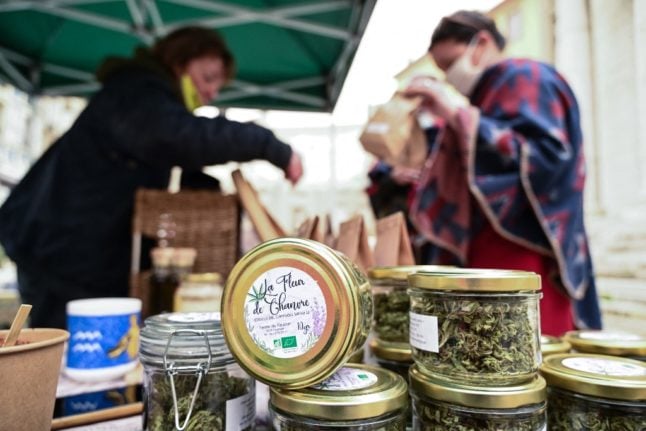Tomany Macalou got his green light for a Paris cannabis shop last November, when a European court chided France for cracking down on cannabis products stripped of the THC molecules that get people high.
Moving fast, he joined a new crop of entrepreneurs entering a less-illicit side of France’s cannabis market, offering buds but also teas, candy and oils containing only cannabidiol (CBD), the plant’s other main ingredient.
“Some use it to lower their blood pressure or help with insomnia,” Macalou told AFP at his shop, Cannabillion, just a few blocks from a police station in eastern Paris.
Traditional marijuana remains illegal in France, and even though President Emmanuel Macron’s government lowered fines for its use, it has no plans to join the legalisation trend in many countries.
But strict rules on hemp use — products can be made only from the plant’s fibres or seeds, not the leaves — made CBD sales a risky business.
WATCH THE VIDEO HERE:
Video produced by Alex Dunham
The law also says only trace amounts of less than 0.2 percent of THC can be present, a level that is easily exceeded — though still harmless — when extracting CBD from flowers, and none at all in items destined for human consumption.
Two years ago, authorities shut down dozens of businesses that had hoped to ride the wave of popularity for a compound that promises natural relaxation and other health benefits, though some experts dispute the health claims.
In November, however, the European Court of Justice said France was violating EU free market rules by forbidding imported CBD obtained from the entire plant, flowers and all.
“I knew the decision was coming, so as soon as it came I felt confident enough to go ahead,” Macalou said.
‘Radically changed’
France is already Europe’s largest producer of hemp, though mainly for the construction and textile industries.
The country now counts some 400 CBD shops, according to the SPC alliance of hemp professionals.
That’s nearly four times the number that were operational before the government’s crackdown two years ago, representing a market worth €150 million to 200 million ($180-$240 million).
“The context has radically changed,” said Aurelien Delecroix, the SPC’s president. “At the time, the association with recreational cannabis was incredibly damaging for the sector.”
But a growing appetite for natural remedies is attracting a wider range of clients, he said, and most shops have dropped their transgressive vibes for more a sober ambiance: Think pharmacy or organic grocery, not an Amsterdam coffee shop.
“I find it enjoyable and relaxing,” said Thomas Leclair, an architect in his 30s, who was at Cannabillion to buy tea as well as herb “so I smoke fewer cigarettes”.
“I also bought some oils that you put under your tongue: My roommate says it helps ease the pain when she has her period,” he said.

‘Reassured’
Jonathan Msika worked in the pharmaceutical industry for over 20 years before he made the jump to CBD, opening his Perfect Time boutique near the Place de la Nation in the capital.
“I have elderly clients who say they come here because they’re reassured by the atmosphere. They wouldn’t go to stores that are darker,” he said.
But France’s hemp laws haven’t changed since the European court ruling, meaning shops like his remain vulnerable to administrative closures.
The case was brought by two people in Marseille selling a “Kanavape” e-cigarette that used cartridges imported from the Czech Republic, and who were given suspended prison sentences.
A parliamentary panel report released Wednesday called for an easing of the rules, in particular by lifting the limits on trace THC amounts, to help the CBD market catch up with those in Britain, the United States or Switzerland.
The SPC estimates that could create a billion-euro market within just two years.
“If you have a shop that doesn’t bother the mayor, and get along with the police, work with the authorities and don’t attract the attention of a strict public prosecutor, you’ll be alright,” Delecroix said.
“But if you don’t, you could be taking a big risk.”



 Please whitelist us to continue reading.
Please whitelist us to continue reading.
Don’t understand why anyone would want cannabis sans THC. But that’s probably the old hippy in me.
i, wholeheartedly agree with iainnoble49. though sans hippy.